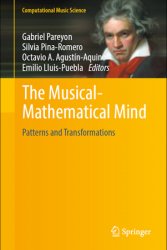
Автор: Gabriel Pareyon, Silvia Pina-Romero, Octavio A. Agust?n-Aquino, Emilio Lluis-Puebla
Название: The Musical-Mathematical Mind: Patterns and Transformations
Издательство: Springer
Год: 2017
Серия: Computational Music Science
ISBN: 978-3-319-47336-9
Язык: English
Формат: pdf
Размер: 12,7 mb
Страниц: 345
In particular the contributed chapters introduce advanced techniques and concepts from modern mathematics and physics, deriving from successes in domains such as Topos theory and physical string theory.
The authors include many of the leading researchers in this domain, and the book will be of value to researchers working in computational music, particularly in the areas of counterpoint, gesture, and Topos theory.
Extended Counterpoint Symmetries and Continuous Counterpoint
Octavio A. Agustin-Aquino
Godel-Vector and G ode 1-Address as Tools for Genealogical Determination of Genetically-Produced Musical Variants
Carlos de Lemos Almada
A Survey of Applications of the Discrete Fourier Transform in Music Theory
Emmanuel Amiot
Gestures on Locales and Localic Topoi
Juan Sebastian Arias
On the Structural and the Abstract in My Compositional Work
Clarence Barlow
A Proposal for a Music Writing for the Visually Impaired
Teresa Campos-Arcaraz
Group Theory for Pitch Sequence Representation: From the Obvious to the Emergent Complexity
Emilio Erandu Ceja-Cardenas
Mazzola’s Eseher Theorem
Yemile Chavez-Martinez and Emilio Lluis-Puebla
The Mechanics of Tipping Points: A Case of Extreme Elasticity in Expressive Timing
Elaine Chew
Lexicographic Orderings of Modes and Morphisms
David Clampitt
Music of Quantum Circles
Micho Burdevich
Partitiogram, Mnet, Vnet and Tnet: Embedded Abstractions Inside Compositional Games
Pauxy Gentil-Nunes
Algebraic Combinatorics on Modes
Franck Jedrzejewski
Proportion. Perception, Speculation: Relationship Between Numbers and Music in the Construction of a Contemporary Pythagoreanism
Juan Sebastian Lach Lau
Topos Echochromas Horou (The Place of the Tone of Space). On the Relationship Between Geometry, Sound and Auditory Cognition
Jaime Alonso Lobato-Cardoso
Models and Algorithms for Music Generated by Physiological Processes
Jaime Alonso Lobato-Cardoso and Pablo Padilla-Longoria
Music, Expectation, and Information Theory
D. Gareth Loy
Gestural Dynamics in Modulation: (Towards) a Musical String Theory
Guerino Mazzola
Manuel M. Ponce’s Piano Sonata No. 2 (1916): An Analysis Using Signature Transformations and Spelled Heptachords
Mariana Montiel
Textural Contour: A Proposal for Textural Hierarchy Through the Ranking of Partitions lexset
Daniel Moreira de Sousa
The Sense of Suhdominant: A Fregean Perspective on Music-Theoretical Conceptualization
Thomas Noll
How Learned Patterns Allow Artist-Level Improvisers to Focus on Hanning and Interaction During Improvisation
Martin Norgaard
Tuning Systems Nested Within the Arnold Tongues: Musicological and Structural Interpretations
Gabriel Pareyon
Wooden Idiophones: Classification Through Phase Synchronization Analysis
Gabriel Pareyon and Silvia Pina-Romero
A Fuzzy Rule Model for High Level Musical Features on Automated Composition Systems
Ivan Paz, Angela Nebot, Francisco Mugica and Enrique Romero
The Musical Experience Between Measurement and Computation: From Symbolic Description to Morphodynaniical Unfolding
Mark Reybrouck
Generic Additive Synthesis. Hints from the Early Foundational Crisis in Mathematics for Experiments in Sound Ontology
Julian Rohrhuber and Juan Sebastian Lach Lau
Dynamical Virtual Sounding Networks
Edmar Soria, Roberto Cabezas and Roberto Morales-Manzanares
Melodic Pattern Segmentation of Polyphonic Music as a Set Partitioning Problem
Tsubasa Tanaka and Koichi Fujii
Diagrams. Games and Time (Towards the Analysis of Open Form Scores)
Samuel Vriezen
On Minimal Change Musical Morphologies
Michael Winter
Restoring the Structural Status of Keys Through DFT Phase Space
Jason Yust
Mazzola, Galois, Peirce, Riemann, and Merleau-Ponty: A Triadic, Spatial Framework for Gesture Theory
Fernando Zalamea
|